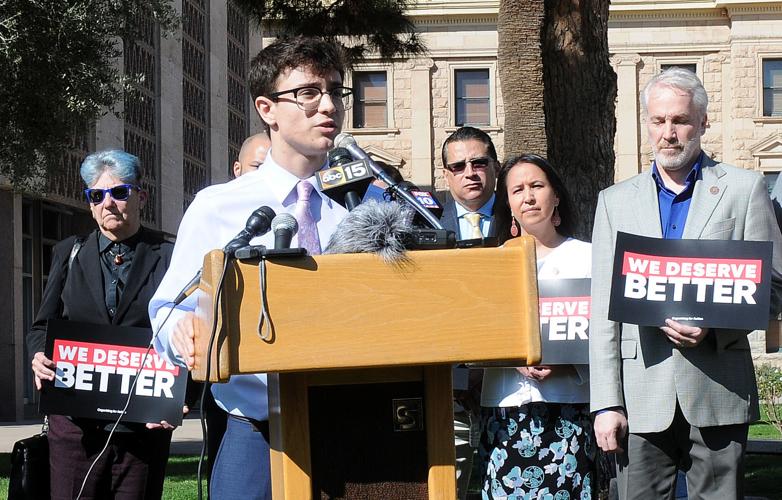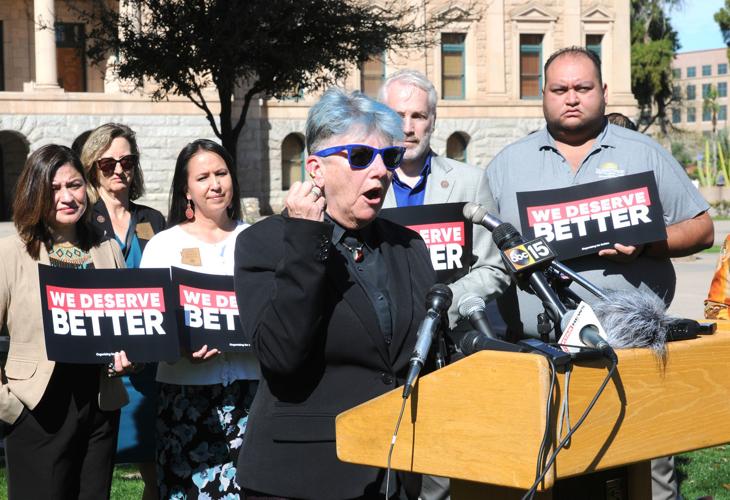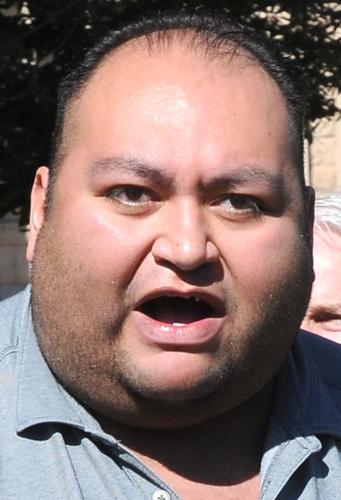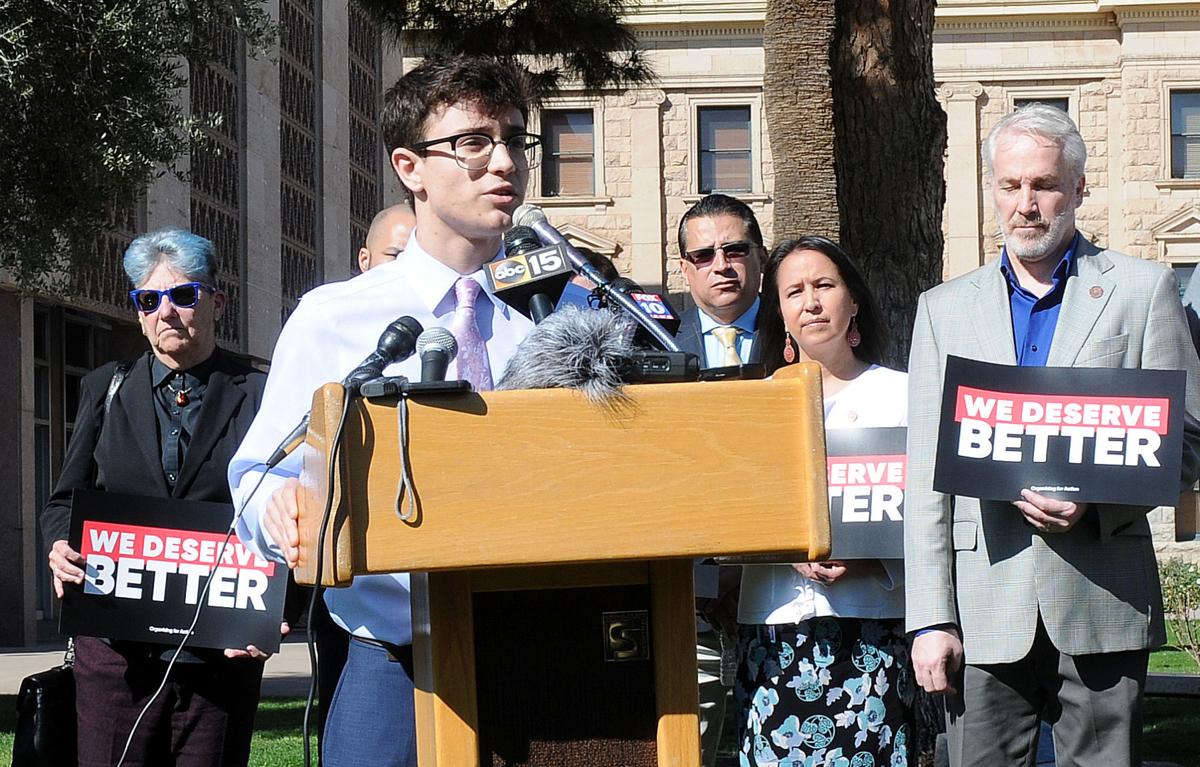PHOENIX — A Mesa Mountain View High School junior said Monday he is helping organize a student walkout Wednesday to get the attention of legislators and urge meaningful limits on access to guns.
Jordan Harb said the walkout — and Capitol rally for students if they’re on spring break — will feature 17 minutes of silence, one for each of the students killed Feb. 14 at Marjory Stoneman High School in Parkland, Florida. The walkout, coordinated nationally, calls for students to step out of class at 10 a.m. March 14 for 17 minutes.
Speaking at a news conference Monday, Harb said the other purpose is “to tell our legislators that we want our lives taken into account.”
The student’s comments came as others at the news conference on the Capitol lawn, advocates of increased regulations on guns, proposed law changes they say would reduce gun violence. These include:
- Requiring universal background checks on buyers.
- Prohibiting people charged with domestic violence from having weapons.
- Allowing a judge to issue a “mental-health injunction” to remove firearms from people found to pose “a significant danger of personal injury to himself or another.”
Harb said while he supports those moves, there’s an even simpler way to help deal with the problem, one that doesn’t wade into the controversy of who gets to have guns: Employ more school counselors.
“I know people who are going through terrible things and have thought about killing themselves,” he said. “And they can’t get help at our school because our psychologist has 4,000 students to deal with. And it’s not OK.”
Much of the frustration expressed at Monday’s news conference centered on the fact that only one measure dealing with weapons got a hearing in the Arizona Legislature this year. That was a bill to override Department of Child Safety rules that foster families cannot have loaded weapons in their homes. It seems to have stalled in the latest outcry over gun violence.
Bills introduced by Democrats in the Republican-controlled Legislature have been unable to get airings. Rep. Randy Friese, D-Tucson, touted House Bill 2024 to require true universal background checks. Under current law, a federally licensed firearm dealer can sell a weapon only after running the buyer’s name through a federal database to see if there is a legal reason he or she cannot have a gun. But that doesn’t apply to person-to-person sales or sales by non-licensed dealers at gun shows.
Gov. Doug Ducey signed legislation just last year to prohibit any background checks on individual sales and precluding cities from having requirements for checks when a gun show is operated on city property.
Speaking with reporters Monday, the Republican governor said his administration is “taking a look at background checks,” including how information about local violations end up in the national database.
“Our focus is on school safety and how we make our schools safer,” Ducey said when meeting with reporters later in the day. “I’m looking to keep all the guns out of the hands of the individuals that should not have them.”
Ducey gave no indication he is interested in closing what some call the “gun-show loophole.”
“There are also federally registered gun dealers at gun shows that perform background checks,” he said when asked about the issue.
That is true. Licensed dealers do have to perform background checks on their own sales. But that doesn’t affect the ability of anyone else to transfer a weapon without a check. The law Ducey signed specifically overruled a Tucson ordinance that said a licensed dealer had to perform a background check for those person-to-person sales.
The governor said he sees background checks through a different lens.
“When a grandfather wants to pass a shotgun down to a grandson, we’re not going to have ... private-exchange background checks,” Ducey said.

Deputy Pima County Attorney Kathleen Mayer argues Monday for lawmakers to approve legislation that allows judges to issue orders seizing the firearms of those who are having a mental health crisis. A bill to do just that never got a hearing at the Capitol.
During the earlier news conference, Deputy Pima County Attorney Kathleen Mayer put in a word for House Bill 2140. It would permit a family member or law enforcer to go to court and get an injunction to take weapons away, at least temporarily, from someone suffering an “acute mental-health crisis.” Mayer said that had such a law been in effect in 2011, Jared Loughner might not have had access to a weapon he used to kill six people and injure 13 others including then-U.S. Rep. Gabrielle Giffords.
“It is up to us to make sure that this bill does get a hearing,” Mayer said. “We have to flood the phone lines, the emails of our legislators to actually stand up and do something.”
Daniel Hernandez, now a Democratic state legislator from Tucson, recalled that he was just 20 at the time, “only two years older than many of the students at Parkland,” when he was working as an intern for Giffords and “had to hold the head of his boss as she was shot in the head.”
“I come as a school board member who served in the Sunnyside Unified School District when the Newtown (Connecticut) shooting happened and we were told, ‘This is it, this is the moment, this is when things will change,”’ he said, recalling the 2012 incident at Sandy Hook Elementary School where 20 children and six educators were killed.
“And now I stand here today as a state representing saying enough is enough,” Hernandez said. “We deserve better. Our kids deserve better.”
Ducey, who calls himself a strong supporter of the Second Amendment, said he is listening to the concerns of various parties and crafting a package he believes will be acceptable.
Lawrence Robinson, president-elect of the Arizona School Boards Association, said the failure of lawmakers to act, even in the wake of the Parkland shooting, has left students unprotected.
He said that in the two weeks following that mass shooting there were 17 incidents in Arizona alone where a student was found bringing a gun onto a school campus, which he said could have led to “a copy-cat incident.”
“We’re playing Russian roulette with our kids,” Robinson said.








